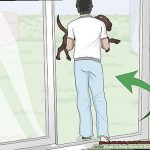Why Does My Frenchie Walk Sideways?
It’s a beautiful day for a walk with your beloved Frenchie.
The sun is shining, the birds are chirping, and your pup is happily trotting by your side. But suddenly, you notice something odd – your Frenchie is walking sideways.
Your mind starts racing with questions: “Why does my Frenchie walk sideways? Is it normal?
Is there something wrong?” Well, fret not fellow Frenchie parents, because in this blog post we will unravel the mystery behind this unique behavior.
So, put on your walking shoes (or paws), grab a snack, and let’s explore the fascinating world of our sideways-walking Frenchies together.
Why Does My Frenchie Walk Sideways?
Contents
- 1 Why Does My Frenchie Walk Sideways?
- 2 The Quirky Side of Frenchies: Walking Sideways
- 3 Common Health Issues in French Bulldogs
- 4 Hip Dysplasia and its Impact on a Frenchie’s Gait
- 5 Patellar Luxation: Causes and Solutions for a Wobbly Walk
- 6 Spinal Problems and their Effect on a Frenchie’s Mobility
- 7 Muscle Weakness and Injuries: How They Contribute to Sideways Walking
- 8 Conclusion
If you are a proud owner of a French Bulldog, you know that these little dogs have big personalities. They are known for their playful and affectionate nature, making them popular pets among dog lovers.

However, one common issue that many Frenchie owners face is their dog walking sideways. This can be a cause for concern and may leave you wondering why your furry friend has developed this unusual gait. As an expert on French Bulldogs, I am here to explain the possible reasons for this behavior.
Hip Dysplasia – The Most Common Cause
One of the most common reasons for sideways walking in Frenchies is hip dysplasia. This is a condition where the hip joint is malformed or dislocated, causing pain and difficulty in movement. French Bulldogs are a brachycephalic breed, meaning they have a short and stocky build, which makes them more prone to hip dysplasia. If your Frenchie is walking sideways, it could be due to this underlying health issue.
Patellar Luxation – Another Culprit
Another possible cause for sideways walking in French Bulldogs is patellar luxation. This condition occurs when the knee cap slips out of its normal position, causing instability in the leg. This can result in a wobbly or sideways gait as your Frenchie tries to compensate for the discomfort.
Other Health Conditions and Injuries
Aside from hip dysplasia and patellar luxation, there are other health conditions that can affect a Frenchie’s gait. Spinal problems such as intervertebral disc disease can cause mobility issues and lead to a sideways walk. Muscle weakness or injuries to the legs can also result in a Frenchie walking sideways as they try to avoid putting pressure on the affected area.
Age Can Play a Role
As Frenchies get older, they may develop arthritis or other joint problems that can affect their gait. This can result in a wobbly or sideways walk as they try to navigate their discomfort. It is essential to take your Frenchie to the vet if you notice them walking sideways, especially if they are older, to determine the underlying cause and receive proper treatment.
The Quirky Side of Frenchies: Walking Sideways
If you’re a proud Frenchie owner, you’re probably all too familiar with their adorable, yet sometimes perplexing, quirks. From their snorts and snuffles to their playful antics, French Bulldogs are known for having larger-than-life personalities. But one behavior that often leaves owners scratching their heads is their tendency to walk sideways.
As an expert on all things Frenchie, I’ve dug deep into the research and have some insights to share on why your furry friend may be walking sideways. So let’s get waddling.
The Body Structure of a Frenchie: Balancing Act or Waddle?
One of the main reasons behind a Frenchie’s sideways walking is their unique body structure. These lovable pups have a larger chest and smaller hindquarters, which can make it challenging for them to balance and walk in a straight line. It’s like trying to walk while constantly carrying a heavy backpack on your front side – it’s not easy.
This can become more pronounced as Frenchies age and their bodies change. As they lose muscle mass and gain weight, it may become even harder for them to maintain proper alignment while walking.
Ouch. Could Pain or Injury Be Causing Your Frenchie’s Waddle?
Another factor to consider is the potential for injury or discomfort. French Bulldogs are prone to joint issues, especially in their hind legs, which can cause pain and affect their gait. If your Frenchie suddenly starts walking sideways or has trouble walking at all, it’s essential to consult with your veterinarian to rule out any underlying health issues.
However, if your Frenchie has always walked sideways and shows no signs of pain or discomfort, it could simply be a quirk of their individual personality. Just like humans have different ways of walking, each Frenchie may have their own unique gait.
Attention-Seeking or Just Showing Off? The Playful Nature of Frenchies
As any Frenchie owner knows, these pups love attention. They’re always looking for ways to make their presence known and get some extra love and affection. So, it’s not surprising that some Frenchies may walk sideways as a way to get noticed or show off.
Common Health Issues in French Bulldogs
French bulldogs are one of the most beloved and popular breeds in the world, known for their charming personalities and unique physical characteristics. One of these quirks that owners often notice is their adorable sideways waddle. While it may be cute to watch, it can also be a cause for concern. As an expert on common health issues in French bulldogs, let’s explore the reasons behind this behavior and how it may be linked to potential health concerns.
Hip Dysplasia: A Common Culprit
One of the main health issues that can cause a French bulldog to walk sideways is hip dysplasia. This condition occurs when the hip joint does not develop properly, leading to instability and discomfort. Due to their compact bodies and short snouts, French bulldogs are prone to this condition. As a result, their femur (thigh bone) may not fit snugly into the hip socket, causing pain and difficulty in walking.
Intervertebral Disc Disease (IVDD)
Another potential cause of sideways walking in French bulldogs is intervertebral disc disease (IVDD). This condition affects the spinal discs, causing them to become compressed or herniated. As a result, the spinal cord and nerves may become compressed, leading to weakness or paralysis in the hind legs. This can result in an unsteady gait and sideways walking.
Patellar Luxation and Neurological Issues
Patellar luxation, or a slipped kneecap, is another common health issue in French bulldogs that can contribute to sideways walking. This occurs when the kneecap slips out of its normal position, causing pain and lameness. Additionally, neurological issues such as degenerative myelopathy or cerebellar hypoplasia can also affect a Frenchie’s coordination and balance, resulting in a wobbly and sideways gait.
Genetics and Breeding Practices
Aside from these common health issues, genetics and breeding practices can also play a significant role in a French bulldog’s tendency to walk sideways. Improper breeding can result in structural abnormalities and predispose them to certain health conditions. It is crucial for breeders to prioritize the health and well-being of their dogs to prevent these issues from occurring.
Hip Dysplasia and its Impact on a Frenchie’s Gait
In this section, we will dive into the impact of hip dysplasia on a Frenchie’s gait and how you can help your furry friend.
What is Hip Dysplasia?
Hip dysplasia occurs when the hip joint is not properly formed, causing instability and improper alignment of the hip bones. This can lead to pain and discomfort for your Frenchie, making it difficult for them to walk properly. In severe cases, it can even result in lameness and difficulty in performing daily activities.
Why are French Bulldogs Prone to Hip Dysplasia?
French Bulldogs are particularly susceptible to hip dysplasia due to their genetics and body structure. Their short and stocky stature, coupled with a large head, puts extra strain on their hips. This makes them more prone to developing this condition.
How Does Hip Dysplasia Affect a Frenchie’s Gait?

One of the most common symptoms of hip dysplasia in French Bulldogs is the sideways walking gait. This is caused by the abnormal hip joint, which makes their hind legs uneven in length, resulting in a wobbly and swaying motion while walking. You may also notice your Frenchie having difficulty getting up from a sitting position or climbing stairs.
What Can You Do to Help Your Frenchie?
As an owner, it is essential to be aware of the signs and symptoms of hip dysplasia in French Bulldogs. Early detection can help prevent the condition from worsening. Here are some tips to help your Frenchie:
- Monitor Their Weight: Maintaining a healthy weight is crucial for dogs with hip dysplasia. Extra weight can put more strain on their hips, making the condition worse.
- Exercise Moderately: While exercise is necessary for your Frenchie’s physical and mental well-being, it is essential to avoid high-impact activities that could worsen their condition. Consult with your veterinarian for appropriate exercise recommendations.
- Provide Joint Supplements: Joint supplements containing glucosamine and chondroitin can help improve joint health and alleviate pain associated with hip dysplasia.
Patellar Luxation: Causes and Solutions for a Wobbly Walk
As a French bulldog owner, you may have noticed your furry companion walking with a wobbly or sideways gait. This can be a cause for concern, as it may affect their mobility and overall quality of life. In this section, we will dive deep into the causes and solutions for a wobbly walk in French bulldogs, specifically focusing on patellar luxation.
What is Patellar Luxation?
Patellar luxation is a condition that occurs when the kneecap (patella) slips out of its normal position, causing it to become dislocated. This can happen when the dog is walking or running, and can lead to discomfort and difficulty in movement.
Genetic Factors:
While the exact cause of patellar luxation is not fully understood, it is believed to be a genetic condition. This means that French bulldogs may inherit this condition from their parents. Therefore, it is important to do thorough research and choose a reputable breeder when getting a Frenchie puppy.
Injuries:
In addition to genetic factors, trauma or injury can also lead to patellar luxation in French bulldogs. This can happen if the dog falls or jumps from a height, putting pressure on the knee joint. It is important to keep an eye on your Frenchie and prevent them from engaging in activities that may put them at risk of injury.
Weak Muscles and Ligaments:
Some French bulldogs may also develop patellar luxation due to weak muscles and ligaments in the knee joint. This is more common in overweight or inactive dogs. It is important to monitor your Frenchie’s weight and provide regular exercise to prevent obesity and strengthen their muscles.
Symptoms of Patellar Luxation:
The most common symptom of patellar luxation in French bulldogs is a wobbly or sideways gait. You may also notice your dog limping or showing signs of pain, such as yelping or reluctance to put weight on the affected leg. If you notice any of these symptoms, it is important to consult your veterinarian for a proper diagnosis and treatment plan.
Spinal Problems and their Effect on a Frenchie’s Mobility
As a French Bulldog owner, you may have noticed your furry friend walking sideways or struggling to move around. While their stocky build and short legs may make them adorable, they also make them prone to certain spinal issues that can greatly affect their mobility. In this section, we will explore how these spinal problems can impact a Frenchie’s ability to walk and what owners can do to help.
Intervertebral Disc Disease (IVDD) – a Common Culprit
One of the most common spinal problems in Frenchies is intervertebral disc disease (IVDD). This occurs when the discs between the vertebrae in the spine degenerate or herniate, putting pressure on the spinal cord and nerves. As a result, your Frenchie may experience pain, weakness, and loss of coordination in their hind legs, making it difficult for them to walk properly. In severe cases, IVDD can even lead to paralysis.
Spinal Stenosis – A Narrowing Nightmare
Another spinal issue that can affect a Frenchie’s mobility is spinal stenosis. This is a narrowing of the spinal canal, which can put pressure on the spinal cord and cause similar symptoms as IVDD. Spinal stenosis is often seen in older Frenchies or those with underlying conditions such as arthritis or degenerative joint disease.
Hemivertebrae – A Curvature Conundrum
French Bulldogs are also prone to developing hemivertebrae, a condition where one or more of the vertebrae are misshapen or fused together. This can cause an abnormal curvature of the spine, leading to difficulty walking and potential nerve damage.
Preventative Measures and Treatment Options
It’s important for owners to be aware of these potential spinal problems in their Frenchies and to seek proper treatment if their dog is showing signs of mobility issues. Treatment options may include anti-inflammatory medications, physical therapy, acupuncture, or in severe cases, surgery. It’s also crucial for owners to take preventative measures such as keeping their Frenchie at a healthy weight, avoiding excessive jumping or rough play, and providing proper support when lifting them.
The Importance of Regular Check-ups
Muscle Weakness and Injuries: How They Contribute to Sideways Walking
French Bulldogs may be small in size, but they are mighty in personality. These adorable pups are known for their unique body structure, which can make them prone to certain health issues. Among these health issues are muscle weakness and injuries, which can significantly affect a Frenchie’s ability to walk normally.
So, how do muscle weakness and injuries contribute to sideways walking in Frenchies? Let’s take a closer look at these factors:
Muscle Weakness:
As mentioned earlier, Frenchies have a unique body structure that makes them prone to muscle weakness. This weakness can be caused by genetic factors or poor breeding practices, where dogs are bred for appearance rather than health. When the hind leg muscles are weak, it can lead to instability and lack of support, making it difficult for the dog to maintain balance while walking. This can result in a sideways gait as the Frenchie tries to compensate for the weak muscles.
Injuries:
Just like any other dog breed, French Bulldogs can also experience injuries that can affect their mobility. Injuries such as muscle strain or tear can occur due to accidents or overexertion. When this happens, it can cause pain and discomfort, leading the dog to favor one side and walk with a sideways motion to alleviate pressure on the affected leg.
What can you do as an owner?
As a Frenchie owner, it is essential to pay close attention to your dog’s gait and seek veterinary care if you notice any signs of muscle weakness or injuries. Proper diagnosis and treatment of these issues can help improve your dog’s mobility and prevent further complications.
Here are some tips to help prevent muscle weakness and injuries in your Frenchie:
- Avoid overexertion: French Bulldogs may have bursts of energy, but they are not built for strenuous activities. Avoid long walks or intense play sessions that can strain their muscles.
- Provide a balanced diet: Proper nutrition is crucial for maintaining muscle strength. Make sure to feed your Frenchie a high-quality diet recommended by your veterinarian.
- Regular exercise: While Frenchies don’t require intense exercise, regular walks and gentle play sessions can help keep their muscles strong and prevent stiffness.
- Be cautious of slippery surfaces: French Bulldogs have a top-heavy body structure, which makes them prone to slipping and falling on smooth surfaces. Be mindful of this and provide traction on slippery floors or avoid them altogether.
Also Read: Do All Lilac English Bulldogs Have Blue Eyes
Conclusion
In conclusion, walking sideways is a behavior that is often seen in French Bulldogs and can be a cause for concern among their owners. However, as we have delved into in this blog post, there are various factors that can contribute to this peculiar gait, from genetic predispositions to underlying health issues.
It is crucial for Frenchie owners to be aware of these potential causes and to seek proper veterinary care if their dog displays any signs of discomfort or difficulty in walking. Whether it’s due to hip dysplasia, patellar luxation, spinal problems, muscle weakness, or injuries, early detection and appropriate treatment are essential for maintaining your Frenchie’s mobility and overall well-being.
As responsible pet owners, it is our responsibility to provide our beloved Frenchies with the best possible care and support. So the next time you take your furry friend out for a stroll on a beautiful day, don’t be surprised if they start waddling sideways.




